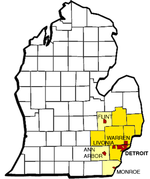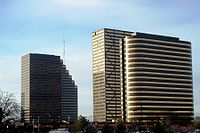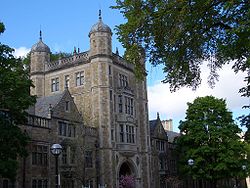- Metro Detroit
-
Metro Detroit
Detroit–Warren–Livonia MSA
Detroit–Ann Arbor–Flint CSA— CSA — Cranbrook Art Museum (top left) in Bloomfield Hills and The Henry Ford (top center) in Dearborn are National Historic Landmarks. A simulated-color satellite image of Metro Detroit, with Windsor across the river, taken on NASA's Landsat 7 satellite. Country  United States
United StatesState  Michigan
MichiganLargest city  Detroit
DetroitCounties Area – Urban 1,261.4 sq mi (3,267 km2) – MSA 3,913 sq mi (10,134.6 km2) – CSA 5,814 sq mi (15,058.2 km2) Elevation 569–1,280 ft (173–390 m) Population (2010) – Urban 3,903,377 (9th) – MSA 4,296,250 (12th) – CSA 5,218,852 (12th) MSA/CSA = 2010, Urban = 2000 Time zone EST (UTC-5) – Summer (DST) EDT (UTC-4) Area code(s) 248, 313, 586, 734, 810, 947 The Detroit metropolitan area, often referred to as Metro Detroit, is the metropolitan area located in Southeast Michigan centered on the city of Detroit which shares an international border with Windsor, Ontario. The Detroit metropolitan area is the second largest U.S. metropolitan area connecting the Great Lakes system to the Saint Lawrence Seaway. As a major metropolitan area, it is known for its automotive heritage, arts, entertainment, and popular music and sports legacies. The area includes a variety of natural landscapes, parks, and beaches with a recreational coastline linking the Great Lakes.
Contents
Definitions
See also: Michigan census statistical areasThe Detroit Urban Area, which serves as the core of the Metropolitan Statistical Area, ranks as the 9th most populous of the United States, with a population of 3,903,377 as of the 2000 census, and area of 1,261.4 square miles (3,267 km2). This urbanized area covers parts of the counties of Wayne, Oakland, and Macomb.[1] These counties are sometimes referred to informally as the Detroit Tri-County Area, and had a population of 3,863,888 as of the 2010 census with an area of 1,967.1 square miles (5,095 km2).
The United States Office of Management and Budget defines the Detroit–Warren–Livonia Metropolitan Statistical Area (MSA) as the six counties of Lapeer, Livingston, Macomb, Oakland, St. Clair, and Wayne. As of the 2010 census, the MSA had a population of 4,296,250. The MSA covers an area of 3,913 square miles (10,130 km2).
The nine-county area designated by the United States Census Bureau as the Detroit–Ann Arbor–Flint Combined Statistical Area (CSA) includes the three additional counties of Genesee, Monroe, and Washtenaw, the metropolitan areas of Flint, Ann Arbor, and Monroe, plus the Detroit-Warren-Livonia MSA. It had a population of 5,218,852 as of the 2010 census. This CSA covers an area of 5,814 square miles (15,060 km2). Lenawee County was removed from Detroit's CSA in 2000.
With the adjacent city of Windsor, Ontario and its suburbs, the combined Detroit-Windsor area has a population of about 5.7 million.[2] When the nearby Toledo Metropolitan Area and its commuters are taken into account, the region constitutes a much larger population center. An estimated 46 million people live within a 300-mile (480 km) radius of Detroit proper.[3] Metro Detroit is at the center of an emerging Great Lakes Megalopolis.
Economy
Main article: Economy of metropolitan DetroitSee also: List of companies based in MichiganThe region's nine county area with its population of 5.3 million has a workforce of about 2.6 million with about 247,000 businesses.[4]In May 2011, the metro area unemployment rate was 11.6 percent.[5][6] Metro Detroit has made Michigan's economy a leader in information technology, biotechnology, and advanced manufacturing; Michigan ranks fourth nationally in high tech employment with 568,000 high tech workers, including 70,000 in the automotive industry.[7][8] Michigan typically ranks second or third in overall Research & development (R&D) expenditures in the United States.[9][10] Metro Detroit is an important source of engineering job opportunities. As the home of the "Big Three" American automakers (General Motors, Ford, and Chrysler), it is the world's traditional automotive center and a key pillar of the U.S. economy.[11][12][13] In the 2010s, the domestic auto industry accounts, directly and indirectly, for one of ten jobs in the United States making it a significant component for economic recovery.[14]
 The Renaissance Center, GM's world headquarters
The Renaissance Center, GM's world headquarters
Since 2009, GM, Ford, and Chrysler have managed a significant reorganization of their benefit funds structure after a volatile stock market which followed the September 11, 2001 attacks and early 2000s recession impacted their respective U.S. pension and benefit funds (OPEB).[15][16][17] In 2009, GM and Chrysler emerged from Chapter 11 restructurings with financing provided in part by the U.S. and Canadian governments.[18] For 2010, the domestic automakers have reported significant profits indicating the beginning of rebound.[19] [20][21][22]
Metro Detroit serves as the headquarters for the United States Army TACOM Life Cycle Management Command (TACOM), with Selfridge Air National Guard Base. Detroit Metropolitan Airport (DTW) is one of America's largest and most recently modernized facilities, with six major runways, Boeing 747 maintenance facilities, and an attached Westin Hotel and Conference Center.
Detroit is a major U.S. port[23] with an extensive toll-free expressway system.[24][25] A 2004 Border Transportation Partnership study showed that 150,000 jobs in the Detroit-Windsor region and $13 billion in annual production depend on Detroit's international border crossing.[26] A source of top talent, the University of Michigan in Ann Arbor is one of the world's leading research institutions,[27] and Wayne State University in Detroit has the largest single-campus medical school in the United States.[28]
From the metro area economy, Michigan was second in the U.S. in 2004 for in new corporate facilities and expansions.[29] From 1997 to 2004, Michigan was the only state to top the 10,000 mark for the number of major new developments.[29] Metro Detroit is a leading corporate location with major office complexes such as the Renaissance Center, the Southfield Town Center, and Cadillac Place with the Fisher Building in the historic New Center area. Both BorgWarner and TRW Automotive Holdings chose Metro Detroit for their new headquarters. Quicken Loans, Ernst & Young, Ally Financial, Visteon, and OnStar are sources of growth.
Compuware, IBM, Google, and Covansys are examples information technology and software companies with a headquarters or major presence in Metro Detroit. HP Enterprise Services makes Metro Detroit its regional headquarters, and one of its largest global employment locations. The metropolitan Detroit area has one of the nation's largest office markets with 147,082,003 square feet.[30] Virtually every major U.S company and many from around the globe have a presence in Metro Detroit. Chrysler's largest corporate facility is its U.S. headquarters and technology center in the Detroit suburb of Auburn Hills. In decade leading up to 2006, downtown Detroit gained more than $15 billion in new investment from private and public sectors.[31]
Tourism
Main articles: Architecture of metropolitan Detroit, Tourism in metropolitan Detroit, and Culture of DetroitTourism is an important component of the region's culture and economy, comprising nine percent of the area's two million jobs.[32] About 15.9 million people visit metro Detroit annually, spending about $4.8 billion.[33] Detroit is the largest city or metro area in the U.S. to offer casino resort hotels (MGM Grand Detroit, MotorCity Casino, Greektown Casino, and nearby Caesars Windsor).[34]
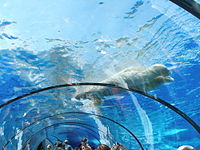 The Detroit Zoo's Arctic Ring of Life.
The Detroit Zoo's Arctic Ring of Life.
Metro Detroit is a tourist destination easily accommodating super-sized crowds to events such as the North American International Auto Show, the Windsor-Detroit International Freedom Festival, 2009 NCAA Final Four, and Super Bowl XL. The Detroit International Riverfront links the Renaissance Center a series of venues, parks, restaurants, and hotels. In 2006, the four-day Motown Winter Blast drew a cold weather crowd of about 1.2 million people to Campus Martius Park area downtown.[35]
Detroit's metroparks include fresh water beaches such as Metropolitan Beach, Kensington Beach, and Stony Creek Beach. Metro Detroit offers canoeing through the Huron-Clinton Metroparks as well as downhill and cross-county skiing at Alpine Valley Ski Resort, Mt. Brighton, Mt. Holly, and Pine Knob Ski Resort. The Detroit River International Wildlife Refuge is the only international wildlife preserve in North America, uniquely located in the heart of a major metropolitan area. The Refuge includes islands, coastal wetlands, marshes, shoals, and waterfront lands along 48 miles (77 km) of the Detroit River and Western Lake Erie shoreline.
Metro Detroit contains a number of shopping malls, including the upscale Somerset Collection in Troy and the Great Lakes Crossing outlet mall in Auburn Hills, both major draws for tourists.
The region's leading attraction is The Henry Ford, located in the Detroit suburb of Dearborn, which is America's largest indoor-outdoor museum complex.[36][37] The recent renovation of the Renaissance Center, a state of the art cruise ship dock, new stadiums, and a new RiverWalk have spurred economic development. Nearby Windsor has a 19 year old drinking age with a myriad of entertainment to complement Detroit's Greektown district. Tourism planners have yet to tap the potential economic impact of the estimated 46 million people that live within a 300-mile (480-km) radius of Detroit.[3][38]
Demographics
 A view of the Detroit International Riverfront from Belle Isle.
A view of the Detroit International Riverfront from Belle Isle. See also: Michigan locations by per capita income
See also: Michigan locations by per capita incomeAs of the census of 2010, there were 4,296,250 people, 1,682,111 households, and 1,110,454 families residing within the metropolitan statistical area. The census reported 70.1% White, 22.8% African American, 0.3% Native American, 3.3% Asian, 0.02% Pacific Islander, 1.2% from other races, and 2.2% from two or more races. Hispanic or Latino of any race were 6.2% of the population.
As of the 2010 American Community Survey estimates, the median income for a household in the MSA was $48,198, and the median income for a family was $62,119. The per capita income for the MSA was $25,403. The region's foreign-born population sat at 8.6%.
Historical populations Census Pop. %± 1950 3,016,197 — 1960 3,762,360 24.7% 1970 4,307,470 14.5% 1980 4,353,365 1.1% 1990 4,382,299 0.7% 2000 4,452,557 1.6% Est. 2010 4,296,250 −3.5% In 1701, French officer Antoine de La Mothe Cadillac, along with fifty-one additional French-Canadians, founded a settlement called Fort Ponchartrain du Détroit, naming it after the comte de Pontchartrain, Minister of Marine under Louis XIV. The French legacy can be observed today in the names of many area cities (ex. Detroit, Grosse Pointe, Grosse Ile) and streets (ex. Gratiot, Beaubien, St. Antoine, Cadieux). Later came an influx of persons of British and German descent, followed by Polish, Irish, Italian, Lebanese, Assyrian/Chaldean, Greek, Jewish, and Belgian immigrants who made their way to the area in the early 20 century and during and after World War II.[39] There was a large migration into the city of from the rural South following World War I.[39]
Today, the Detroit suburbs in Oakland County, Macomb County, and northeastern and northwestern Wayne County are predominantly Caucasian. Oakland County is among the most affluent counties in the United States with populations over one million.[40] In Wayne County, the city of Dearborn has a large concentration of Arab Americans, mainly Lebanese. Recently, the area has witnessed some growth in Albanian, Asian and Hispanic populations. Immigration continues to play a role in the region's projected growth with the population of Detroit-Ann Arbor-Flint (CMSA) estimated to be 6,191,000 by 2025.[41]
In the 2000s, 115 of the 185 cities and townships in Metro Detroit were over 95% white. Of the more than 240,000 suburban blacks in Metro Detroit, 44% lived in Inkster, Oak Park, Pontiac, and Southfield; most of the African American population in the area resided in Detroit, Highland Park, Inkster, Pontiac, and Southfield.[42]
Transportation
Main article: Transportation in metropolitan Detroit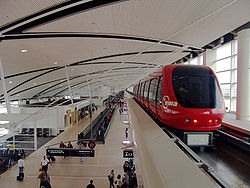 Detroit Metropolitan Airport is the region's major international airport. The McNamara Terminal's ExpressTram is used to transport passengers from one end of the terminal to the other
Detroit Metropolitan Airport is the region's major international airport. The McNamara Terminal's ExpressTram is used to transport passengers from one end of the terminal to the other
Airports
- Ann Arbor Municipal Airport (ARB)
- Coleman A. Young International Airport (DET) (Detroit) - General aviation only
- Detroit Metropolitan Wayne County Airport (DTW) (Romulus) - Major commercial airport, hub for Delta Air Lines and Spirit Airlines
- Flint-Bishop International Airport(FNT) (Flint) - Commercial airport
- Oakland County International Airport (PTK) Waterford Township) - Charter passenger facility
- St. Clair County International Airport (near Port Huron, Michigan) - An international airport on the U.S. and Canadian Border.
- Selfridge Air National Guard Base (Mount Clemens) - Military airbase
- Willow Run Airport (YIP) (Ypsilanti) - Cargo, general aviation, charter passenger traffic
Transit systems
Bus service for the metropolitan area is provided jointly by the Detroit Department of Transportation (DDOT) and Suburban Mobility Authority for Regional Transportation (SMART) which operate under a cooperative service and fare agreement. The Woodward Avenue Light Rail, beginning in 2013, will serve as a link between the Detroit People Mover monorail which encircles the downtown and SEMCOG Commuter Rail which extends from Detroit's New Center area to The Henry Ford, Dearborn, Detroit Metropolitan Airport, Ypsilanti, and Ann Arbor[43]
Roads and freeways
Main article: Roads and freeways in metropolitan DetroitThe Metro Detroit area is linked by an advanced network of major roads and freeways which include Interstate highways. Traditionally, Detroiters refer to some of their freeways by name rather than route number. The Davison, Lodge, and Southfield freeways are almost always referred to by name rather than route number. Detroiters commonly precede freeway names with the word 'the' as in the Lodge, the Southfield, and the Davison. Those without names are referred to by number.
Surface street navigation in Metro Detroit is commonly anchored by "mile roads", major east-west surface streets that are spaced at one-mile (1.6 km) intervals and increment as one travels north and away from the city center. Mile roads sometimes have two names, the numeric name (ex. 15 Mile Road) used in Macomb County and a local name (ex. Maple Road) used in Oakland County mostly.
Freeways in metropolitan Detroit 
Education
See also: List of high schools in MichiganArea codes
Metro Detroit is served by eight telephone area codes (six not including Windsor). The 313 area code, which used to encompass all of Southeast Michigan, has been narrowed to the city of Detroit and a few close suburbs.
- The 248 area code along with the newer 947 area code overlay mostly serve Oakland County.
- Macomb County is largely served by 586.
- Genesee, St. Clair, and Lapeer counties, eastern Livingston County, and part of northern Oakland County are covered by 810.
- Washtenaw, Monroe, and western Wayne are in the 734 area.
- The Windsor area (and most of southwestern Ontario) is served by 519 and 226.
Sports
See also: Sports in metropolitan DetroitProfessional sports has a major fan following in Metro Detroit. The area is home to many sports teams, including six professional teams in four major sports. The area's several universities field teams in a variety of sports. Michigan Stadium, home of the Michigan Wolverines, is the largest American football stadium in the world. Metro Detroit hosts many annual sporting events including auto and hydroplane racing. The area has hosted many major sporting events, including the 1994 FIFA World Cup, Super Bowl XVI, Super Bowl XL, the 2005 Major League Baseball All-Star Game, and the first two games of the 2006 World Series.
See also
- Detroit travel guide from Wikitravel
- Images of Metro Detroit
Notes and references
- ^ Detroit Metro Convention & Visitors Bureau
- ^ Windsor, Ontario. Retrieved on July 18, 2010.
- ^ a b Cities located close to Detroit.Time and Date world clock distances. Retrieved on September 2, 2007.
- ^ Regional Profile Detroit Regional Chamber. Retrieved on June 17, 2009.
- ^ Bureau of Labor Statistics (January 2011). Unemployment rates for metropolitan areas. U.S. Department of Labor. Retrieved January 12, 2011.
- ^ Michigan Department of Labor and Economic Growth. Retrieved January 12, 2011.
- ^ MEDC (2009).Michigan: High Technology Focus State of Michigan. Retrieved on June 17, 2009.
- ^ Metro Detroit, Michigan score high in biotech VC rankings. Metromode 12-17-2009. Retrieved on July 14, 2010.
- ^ MEDC,(2009).Michigan Advantage State of Michigan. Retrieved on June 17, 2009.
- ^ NSF 01-320 (2001).R&D Spending is Highly Concentrated in a Small Number of States National Science Foundation
- ^ "Michigan Cities". Encyclopedia Britannica Online. http://student.britannica.com/comptons/article-204598/Michigan. Retrieved December 26, 2008. "[Detroit] is the automobile capital of the world"
- ^ "SAE World Congress convenes in Detroit". http://www.sae.org/congress/. Retrieved December 26, 2008.
- ^ Lawrence, Peter (2009).Interview with Michigan's Governor, Corporate Design Foundation. Retrieved on May 2, 2009. "Michigan is known as the world's automotive center."
- ^ Alliance of Automobile Manufacturers (2006).From the 2003 Study "Contributions of the Automotive Industry to the U.S. Economy" University of Michigan and the Center for Automotive Research Autoalliance.com
- ^ Sloan, Allan (April 10, 2007).GM's High-Performance Pension Machine Washington Post, D02.
- ^ Lindorff, Dave (April 19, 2005).Health Care Costs and the Jobs Flight to Canada Counterpunch. Retrieved on April 24, 2007.
- ^ National Association of Manufacturers (February 2008).Facts about Michigan Manufacturing. Retrieved on June 17, 2009.
- ^ Garrett, Major (March 31, 2009).White House Plots GM Bankruptcy, Unsure When Taxpayers Will Recoup $50 Billion Investment.Fox News. Retrieved on June 23, 2009.
- ^ Shoenberger, Robert (May 25, 2010).Rebounding auto industry boosts Shiloh Industries' second-quarter sales, profit. Cleveland.com. Retrieved on September 18, 2010.
- ^ Schroeder, Robert (July 30, 2010).Obama says U.S. auto industry on rebound. Wall Street Journal. Retrieved on September 9, 2010.
- ^ GM posts profit, CEO Whitacre to retire.CNN Money. Retrieved on September 18, 2010.
- ^ Cwiek, Sarah (November 30, 2010).New study shows strong economic recovery in Metro Detroit. NPR Michigan. Retrieved December 4, 2010.
- ^ Why MITA will be a success.Michigan International Trade Association. Retrieved on September 3, 2007. "Detroit is the most active commercial port of entry in the USA." "Greater Detroit is the number one exporting region among 310 defined metropolitan areas (CMSA) in the U.S."
- ^ Regional Advantages for International Business. World Trade Center Detroit Windsor. Retrieved on September 3, 2007.
- ^ Why doesn't Michigan have toll roads?.Michigan Department of Transportation. Retrieved on September 5, 2007. "A system of toll free highways has been viewed as important to commerce, industry, tourism, and general economic development."
- ^ Detroit Regional Chamber (2006) Detroit/Windsor Border Update: Part I-Detroit River International Crossing Study
- ^ "Annual Report on Research, Scholarship and Creative Activity at the University of Michigan FY2006" (PDF). UM Research. January 18, 2007. Archived from the original on 2007-09-25. http://web.archive.org/web/20070925204956/http://www.research.umich.edu/research_guide/annual_reports/FY06/FY06ResearchExpenditures.pdf. Retrieved 2007-11-14.
- ^ Grad profiles. Wayne State. Retrieved on October 27, 2008.
- ^ a b MEDC (2005) Michigan #2 in the Nation for New Corporate Facilities and Expansions in 2004 Globeinvestor.com PR NEWS WIRE
- ^ Colliers International Market report, 2006
- ^ The Urban Markets Initiative, Brookings Institution Metropolitan Policy Program The Social Compact, Inc. University of Michigan Graduate Real Estate Program (October 2006).Downtown Detroit In Focus: A Profile of Market Opportunity. Downtown Detroit Partnership. Retrieved on July 14, 2010.
- ^ "Detroit: Economy Major Industries and Commercial Activity". Advameg, Inc.. http://www.city-data.com/us-cities/The-Midwest/Detroit-Economy.html. Retrieved 2008-06-12.
- ^ Metro Detroit Convention and Visitors Bureau statistics
- ^ Mink, Randy, and Karen Mink (July 2001).Detroit Turns 300 - Detroit 300 Festival. Travel America, World Publishing Co., Gale Group.
- ^ Fifth Third Bank rocks the Winter Blast.Michigan Chronicle.(March 14, 2006).
- ^ America's Story, Explore the States: Michigan (2006). Henry Ford Museum and Greenfield Village Library of Congress
- ^ State of Michigan: MI Kids (2006).Henry Ford Museum and Greenfield Village
- ^ Audi, Tamara (September 26, 2007). What Happens In Detroit. The Wall Street Journal, B6. "But the market at issue, as MGM Mirage sees it, includes a 300-mile radius of potential overnight clients across the region,"
- ^ a b Baulch, Vivian M. (September 4, 1999). Michigan's greatest treasure -- Its people. Michigan History, The Detroit News. Retrieved on April 4, 2009.
- ^ "2004–05 Community profile Oakland County". Archived from the original on 9 July 2007. http://web.archive.org/web/20070709220902/http://www.oakgov.com/peds/assets/docs/community_profiles/OakCounty.pdf#search=%22Oakland%20County%20richest%22. Retrieved 11 July 2007. "Oakland County also ranks as the fourth wealthiest county in the nation among counties with populations of more than one million people."
- ^ Metro Area Factsheet: Detroit-Ann Arbor-Flint, Michigan CMSA.Federation for Immigration Reform. Retrieved on April 12, 2011.
- ^ Towbridge, Gordon. "Racial divide widest in US." The Detroit News. January 14, 2002. Retrieved on March 30, 2009.
- ^ Ann Arbor - Detroit Regional Rail Project SEMCOG. Retrieved on February 4, 2010.
External links
- Southeast Michigan Council of Governments
- Clarke Historical Library, Central Michigan University, Bibliography on Michigan (arranged by counties and regions)
- Michigan Geology -- Clarke Historical Library, Central Michigan University.
- Michigan's Official Economic Development and Travel Site.
- "Historic Light Station Information and Photography: Michigan". United States Coast Guard Historian's Office. http://www.uscg.mil/history/weblighthouses/LHMI.asp.
- Map of Michigan Lighthouse in PDF Format.
City of Detroit Architecture · Culture · Detroit River · Economy · Freeways · Government · History · Historic places · International Riverfront · Media · Music · Neighborhoods · Parks and beaches · People · Skyscrapers · Sports · Theatre · Tourism · Transportation
 Metro Detroit · Michigan · United States
Metro Detroit · Michigan · United StatesMetro Detroit Topics Architecture · Culture · Detroit River · Economy · Freeways · History · Historic places · International Riverfront · Lake St. Clair · Media · Music · Parks and beaches · People · Skyscrapers · Sports · Theatre · Tourism · Transportation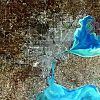
Major city Municipalities
over 80,000Canton Township · Clinton Township · Dearborn · Livonia · Sterling Heights · Troy · Warren · WestlandMunicipalities
45,000 to 80,000Dearborn Heights · Farmington Hills · Grosse Pointe · Macomb Township · Novi · Pontiac · Redford Township · Rochester Hills · Royal Oak · St. Clair Shores · Shelby Township · Southfield · Taylor · Waterford Township · West Bloomfield TownshipSatellite cities Counties in MSA Counties in CSA Regions Outlying regions 50 largest metropolitan statistical areas in the United States by population - New York
- Los Angeles
- Chicago
- Dallas–Fort Worth
- Philadelphia
- Houston
- Washington
- Miami
- Atlanta
- Boston
- San Francisco–Oakland
- Detroit
- Riverside–San Bernardino
- Phoenix
- Seattle
- Minneapolis–St. Paul
- San Diego
- St. Louis
- Tampa–St. Petersburg
- Baltimore
- Memphis
- Louisville
- Richmond
- Oklahoma City
- Hartford
- New Orleans
- Buffalo
- Raleigh
- Birmingham
- Salt Lake City
Categories:
Wikimedia Foundation. 2010.



